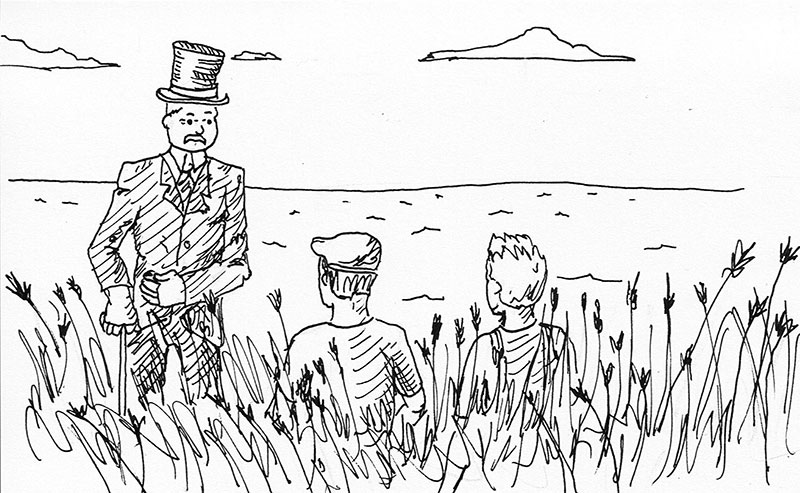When we were tired of this sight we wandered slowly into Ringsend. The day had grown sultry, and in the windows of the grocers’ shops musty biscuits lay bleaching. We bought some biscuits and chocolate which we ate sedulously as we wandered through the squalid streets where the families of the fishermen live. We could find no dairy and so we went into a huckster’s shop and bought a bottle of raspberry lemonade each. Refreshed by this, Mahony chased a cat down a lane, but the cat escaped into a wide field. We both felt rather tired and when we reached the field we made at once for a sloping bank over the ridge of which we could see the Dodder.
It was too late and we were too tired to carry out our project of visiting the Pigeon House. We had to be home before four o’clock lest our adventure should be discovered. Mahony looked regretfully at his catapult and I had to suggest going home by train before he regained any cheerfulness. The sun went in behind some clouds and left us to our jaded thoughts and the crumbs of our provisions.
There was nobody but ourselves in the field. When we had lain on the bank for some time without speaking I saw a man approaching from the far end of the field. I watched him lazily as I chewed one of those green stems on which girls tell fortunes. He came along by the bank slowly. He walked with one hand upon his hip and in the other hand he held a stick with which he tapped the turf lightly. He was shabbily dressed in a suit of greenish-black and wore what we used to call a jerry hat with a high crown. He seemed to be fairly old for his moustache was ashen-grey. When he passed at our feet he glanced up at us quickly and then continued his way. We followed him with our eyes and saw that when he had gone on for perhaps fifty paces he turned about and began to retrace his steps. He walked towards us very slowly, always tapping the ground with his stick, so slowly that I thought he was looking for something in the grass.
He stopped when he came level with us and bade us good-day. We answered him and he sat down beside us on the slope slowly and with great care. He began to talk of the weather, saying that it would be a very hot summer and adding that the seasons had changed greatly since he was a boy—a long time ago. He said that the happiest time of one’s life was undoubtedly one’s schoolboy days and that he would give anything to be young again. While he expressed these sentiments which bored us a little we kept silent. Then he began to talk of school and of books. He asked us whether we had read the poetry of Thomas Moore or the works of Sir Walter Scott and Lord Lytton. I pretended that I had read every book he mentioned so that in the end he said:
“Ah, I can see you are a bookworm like myself. Now,” he added, pointing to Mahony who was regarding us with open eyes, “he is different; he goes in for games.”

